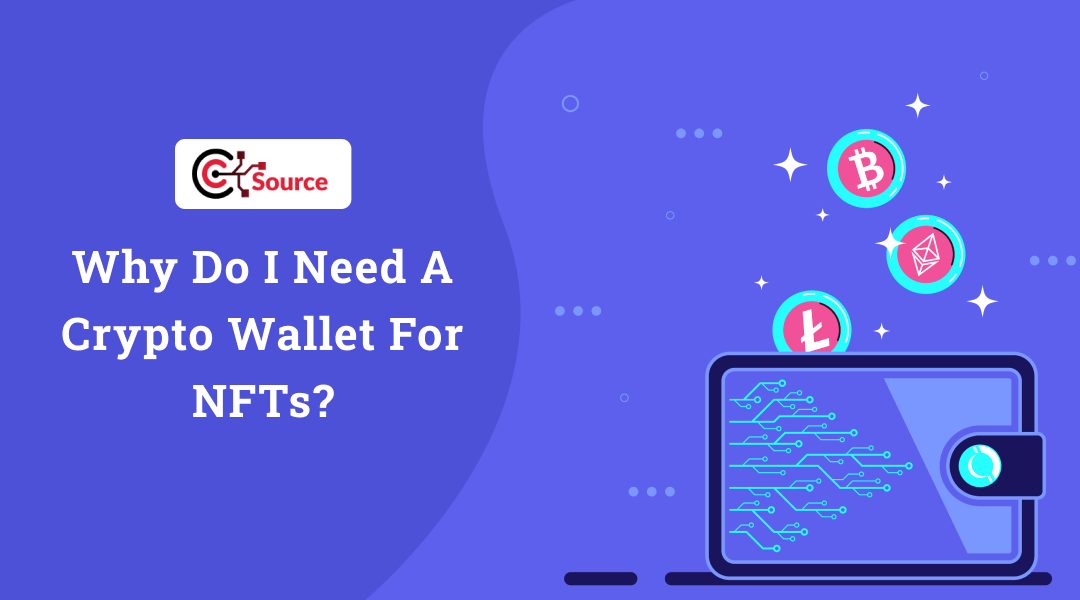While cryptocurrency wallets initially served as tools for transferring and receiving digital currency, the emergence of NFTs and DeFi initiatives has caused many wallets to adapt and focus on giving customers secure access to their NFTs. Simply put, a crypto wallet gives users “private keys”—passwords—that provide them access to money and other items kept on the blockchain. A wallet will be a necessary piece of equipment to get started if you want to start collecting NFTs.
People sometimes wonder as to why they need a crypto wallet for NFTs or why they should even store their NFT in a crypto wallet. In this blog by ChainTechSource, a popular blockchain- and NFT-based products and solutions provider, we take a deeper look into crypto wallets and the real need for it in relation to NFTs.
Overview of Crypto Wallet
A crypto wallet is a piece of software or hardware that enables communication between users and blockchain networks. When transmitting and receiving bitcoin and other digital money, they are essential. Additionally, a cryptocurrency wallet creates a private key for the asset’s blockchain address. Any transaction on that address must be authorized using this private key.
Crypto wallets don’t actually store your money, unlike a traditional wallet that keeps your cash and credit cards. The wallets serve as a way to access coins or tokens, whether it’s for sending or receiving your digital assets. Coins or tokens are part of a blockchain system as data. Having said that, a crypto wallet can be used to hold more than just cryptocurrencies.
The Need for Crypto Wallets for NFTs
First and foremost, it’s crucial to understand that the wallet does not really store any cryptocurrency or NFTs. On the blockchain, these are kept. The word “wallet” may be a little deceptive because, unlike a typical leather wallet stuffed with unused membership cards and old coins, a cryptocurrency wallet does not actually hold any of your assets.
- Access to blockchain:
A crypto wallet offers access to the blockchain where your funds are kept, similar to how a debit card serves as a key to an ATM rather than actually storing your money. Private keys, which are essentially digital passwords that enable blockchain transactions, are stored in a crypto wallet.
- Secure access to NFTs:
Your NFTs can be accessed securely through these wallets as well, protecting them. A wallet is a symbol of ownership. The assets are controlled by whoever owns the keys that the wallet contains. Web extensions, desktop programs, and mobile applications all support software wallets. Many wallets, including the widely used MetaMask.
- Generate public and private keys:
In addition to an account password, the majority of cryptocurrency wallets will provide you with a seed phrase, which is a group of unusual phrases that forms your keys and enables you to recover your account. Your wallet creates a public key in addition to a private key, which is then used to create an address on the blockchain. When assets or money are swapped, only the address is altered; the assets or money never leave the blockchain.
- Approve transactions:
Access to private funds and transaction approval are both handled by the private key. You still have your private key, therefore the account is not lost, even if the hardware the wallet is stored on is lost or damaged. It is crucial to protect your private key since it gives you access to your NFTs and cryptocurrency assets and authorizes transactions and wallets to keep them as secure as possible. For instance, a 12-word seed phrase is needed to retrieve private keys in MetaMask, among many other programs.
- Maximize security:
Many wallets provide extra security features, such as two-factor authentications. Enjin, a well-known cryptocurrency wallet, has a built-in keyboard to ward off keyloggers and personalized ARM instructions to rapidly protect sensitive data. You could just give someone the private key if you wanted to transmit an NFT to them. However, doing so would be dangerous and impractical. Wallets thereby enable the simple, secure processing and storing of NFTs. For this reason, an NFT enthusiast’s toolkit must include a crypto-wallet.
- Increased convenience:
The convenience a wallet offers is another justification for setting one up. A well-designed wallet that can house all of your cryptocurrency holdings will make NFT buying a breeze. With the aid of a nice wallet, you can effortlessly navigate your possessions and keep everything organized. It’s convenient that many cryptocurrency wallets feature built-in Dapp browsers that may be used to look for your newest NFT, such as Trust Wallet and MetaMask. This makes life simpler because one app can handle both the purchase and the storage.
Conclusion
While the majority of wallets, like MetaMask, are designed for the Ethereum blockchain, if you want to buy an NFT made on a different network, you will need a wallet that supports this. Do not be alarmed; several wallets, like Kukai for the well-known Tezos blockchain, are designed to communicate with alternative blockchains. Every blockchain requires unique technologies in order for a wallet to function with it, and ChainTechSource can help you with it.

